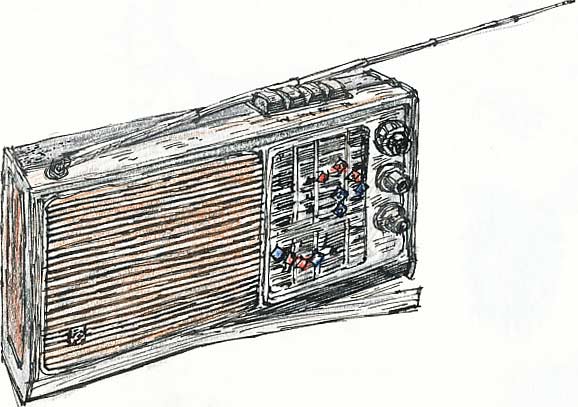Transistor Radio
Wild
West Yorkshire, Monday 6 December 2010
previous
| this
month
| next

Philips (Iberia S.A.) 90RL411, 11 semiconductors (transistors), Super-Heterodyne, Long Wave, Short Wave and FM, Modern Plastics (no Bakelite or Catalin), 270 c 140 c 55mm (10.6 x 5.5 x 2.2 inches), Permanent Magnet Dynamic Loudspeaker, source: Radio Museum, Madrid.
I COULDN'T send my old transistor radio for recycling without drawing it first, as it brings back memories. I bought it in 1972 or 1973 at an electrical store on the Edgeware Road, when I was a student at the Royal College of Art. The red and blue stickers on the tuning panel date from the time that the frequencies of the BBC channels changed, for instance Radio 3 moved to the 247m medium wave band that the tuning panel shows was originally BBC Radio 1. Radios 3 and 4 popped up on FM in stereo pretty much where they are today, but we're now preparing for a digital switchover, so they might be moving on again.
Baker's Dozen
The programme that I most associate with listening to this radio in my room at the college hostel in Evelyn Gardens was a long-running Saturday evening light classics programme These You have Loved, which had a new host at that time, Richard Baker. The show was later rebranded as Baker's Dozen. Baker was the first man to read the BBC television news (in voiceover) in 1954. Apart from light classics, the most memorable songs, regularly featured on this show, were Goodnight Vienna sung by 'whispering' Jack Buchanan, Lazy Bones by Paul Robeson and A Fairy went a Marketing sung by Dame Clara Butt.
I didn't spend every night listening to the radio and I'd always scan the monthly events at the Royal Albert Hall for classical concerts, such as the famous Tchaichovsky evenings. You could sit right up in the gallery for 50 pence so, even as a student on a very limited budget, I could afford that. I saw Leopold Stokowski, Artur Rubenstein, Sir Adrian Boult and pianist John Ogdon perform and Richard Baker once appeared there, narrating Vaughn William's Oxford Elegy which combined passages from Matthew Arnold's Thyrsis and The Scholar-Gypsy. With it's theme of a wandering figure in a familiar landscape - which could be my job description - it's not surprising that some of the lines have stuck with me, for instance:
“Have I not pass'd thee on the wooden bridge
Wrapt in thy cloak and battling with the snow,
Thy face towards Hinksey and its wintry ridge?”
Baker was perfect in diction and metre but it was disconcerting to have a piece of music narrated in a voice that I associated with reading the news. I suspect Matthew Arnold would have been similarly precise in reading his poetry.
I hadn't heard Baker on the radio for years but when Barbara and I completed the longest and toughest stretch of our walk on the Dales Way in April 2004 we caught up with him. After a tough day crossing the Pennine watershed, getting lost in a plantation and pausing to watch a herd of sheep being shepherded across a stream, we arrived at the perfect haven of Lea Yeats bed and breakfast where, as we enjoyed a home-cooked meal with a glass of red wine, playing in the background Richard Baker was introducing a light classics programme on Radio 2. After our 18 mile trek, it was like stepping back into a comforting time warp, conjuring up again the Saturday nights of my college days.
Radio 3 and 4
The other radio programmes of the 1970s that I associate with this Philips' transistor are Vivat Rex!, a complete cycle of plays of medieval kings by Shakespeare, Marlowe and others, The Long March of Everyman, an eye-witness approach to history; Foundation and Empire, an adaption of Isaac Asimov's novel which must have inspired The Hitch-Hiker's Guide to the Galaxy and, in its regular slot on Sunday afternoons, The Living World, a natural history programme recorded on location, presented by Derek Jones and later by Peter France.
Richard
Bell, illustrator
richard@willowisland.co.uk
previous
| this
month
| Wild
West Yorkshire
home page | next
